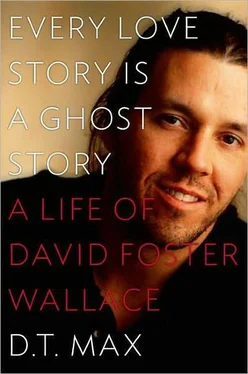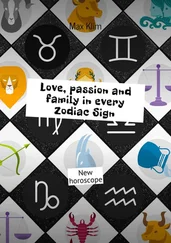Fogle decides to join the IRS, and soon heads off for training in Peoria, after which he is recruited to be part of a team of tax savants — Fogle’s ability, never fleshed out in the text but present in Wallace’s notes, is to recite a string of numbers that grants him total concentration. Wallace liked the many pages he wrote on Fogle well enough to consider publishing them as a short stand-alone novel. Perhaps someone else reading other sections of the book — Wallace would show them to no one — might have been satisfied with those too, but he could not get out from under the shadow of the statue. To the inside cover of a notebook, he taped an anecdote about T. S. Eliot, who had also suffered from crushingly high standards: “One of [Conrad] Aiken’s friends was a patient of the famous analyst Homer Lane, and Aiken told this friend about Eliot’s problem. Lane said to his patient, ‘Tell your friend Aiken to tell his friend Eliot that all that’s stopping him is his fear of putting anything down that is short of perfection. He thinks he’s God.’” (The underlining was Wallace’s).
Wallace had said again and again how much he loved the reader. But how much did he really care whether people found what they were looking for in his books? And how much did he write for himself? One test was his willingness to create a satisfactory plot. He had never liked plot, that tidying up of life in which, as he had written Howard in 1986, “revelations revelationize [and] things are cleared up.” To rely too much on plot risked seducing the reader; it was like selling Tide. Moreover, plots typically involved the gradual maturation of the characters, and that was not how Wallace saw things. His default view of life was more mechanistic than organic. Change in a character — Hal, Gately, Wallace himself at Granada House — was usually a binary flip. Yet he knew an unplotted book violated the physics of reading. So over the years, he slowly cast about for a structure for The Pale King . In one of his notebooks, there is a sentence suggesting that he had hit on a framework of interest: an evil group within the IRS is trying to steal the secrets of an agent who is particularly gifted at maintaining a heightened state of concentration. It was a nice Pynchonian notion, with an echo of the scramble for the “Infinite Jest” video cartridge, but Wallace didn’t follow up on it. Probably it struck him as too clever, a short cut. Instead he divided the agents into two groups: those who wanted to automate the agency versus those who still wished to process returns by hand. His own heart was with the old-fashioned processors. Over the past decade he had been watching the digitalization of media with ever greater discomfort. “Digital=abstract=sterile, somehow,” he had written to DeLillo in 2000. Electronic media facilitated consumerism; it removed obstacles to spectation. It was also that if the IRS was going to be a secular religion, it needed its priests. To Wallace, so troubled by freedom, there was nothing more erotic than people who willingly gave up theirs. But anti-automation was more of an attitude than a plot anyway, as perhaps Wallace knew. There was also the consideration that if you really wanted to capture the mindfulness that comes through boredom, the less plot you had the better. Wallace wrote in a note: “Something big threatens to happen but doesn’t actually happen,” and elsewhere, characterized the novel as “a series of setups for things to happen but nothing ever happens.” Maybe different scenes in suggestive apposition may have been all he wanted for his plot, but if so, he remained worried that the thousands of pages he had written left the reader still too much on his or her own. “The individual parts of this book would not be all that hard to read,” he wrote Nadell in 2007. “It’s more the juxtaposition of them, the number of separate characters, etc.”
And life kept breaking back in. Wallace had become increasingly political over the years, thanks in large part to Green. He was a vocal critic of George W. Bush’s administration. “I am, at present, partisan,” he had told The Believer in 2003. “Worse than that: I feel such deep, visceral antipathy that I can’t seem to think or speak or write in any kind of fair or nuanced way about the current administration…. My own plan for the coming fourteen months is to knock on doors and stuff envelopes. Maybe even to wear a button. To try to accrete with others into a demographically significant mass. To try extra hard to exercise patience, politeness, and imagination on those with whom I disagree. Also to floss more.” When Bush won reelection in 2004, Wallace and Green seriously considered leaving the country, but Wallace felt that would be an overreaction. In the end, he was a writer, not a political operative. He cared about the moral state of the country, more than which side won.
The thought kept recurring to him that he was no longer the kind of person who could write the novel he wanted to write. Infinite Jest had been driven by his dysfunctional yearning for Mary Karr; nothing similar goaded him now. Green had opened up a showroom for her work. She called it Beautiful Crap, a name that happily coincided with the plot of “The Suffering Channel.” She loved her gallery, and they discussed jobs he might enjoy. “He talked about opening up a dog shelter,” she remembers. It would be what the tennis coach Gerhard Schtitt in Infinite Jest meant when he said that the important thing was to “learn to be a good American during a time, boys, when America isn’t good its own self.” Wallace considered, he wrote Franzen, “forgetting about writing for a while if it’s not a source of joy. Who knows. Life sure is short though.” He thought about focusing only on his nonfiction. 18
The Federer piece had been a complete joy. He stopped the nonfiction for a period to see if it made the fiction come easier — was the magazine work dissipating his ability to finish The Pale King ? “It just made him crazy to think he had been working on it for so long,” Green remembers. In his final major interview, given to Le Nouvel Observateur in August 2005, he talked about various writers he admired — Saint Paul, Rousseau, and always, Dostoevsky, among them — and added, “What are envied and coveted here seem to me to be qualities of human beings — capacities of spirit — rather than technical abilities or special talents.”
Around this time, Wallace wrote Nadell, telling her that he needed “to put some kind of duress/pressure on myself so that I quit futzing around and changing my mind about the book twice a week and just actually do it.” Franzen’s example had been an influence; he told Wallace that having a contract for Freedom , the novel that followed The Corrections, had helped focus him. Wallace wasn’t sure. He explored the tax consequences of taking a single payment versus spreading the advance out over the years and worried about the alternative minimum tax. And he prepared a stack of about 150 pages of The Pale King . There were plenty of equally finished pages — among them the story of the levitating Drinion — which, for whatever reason, he did not include. “I could take a couple of years unpaid leave from Pomona and just try to finish it,” he wrote to Nadell. When she encouraged him, he responded more hesitatingly: “Let me noodle hard about it. It may not be until the end of summer that I’d even have a packet together.”
Wallace had never been certain that being on Nardil was the right thing, and whenever he was not writing well, he wondered if it played a role. But the memories of how it had saved his life were also always present. He had read widely about other antidepressants but never found one he thought he should change to. In the summer of 2007, Wallace was eating in a Persian restaurant in Claremont with his parents and began to have heart palpitations and to sweat heavily. These can be the signs of a hypertensive crisis, although Green thinks he may have merely had an anxiety attack — the chicken and rice dish he ordered was one he had eaten many times; he never saw a doctor for a diagnosis. In any event, he eventually went to a physician, who told him what he already knew: there were a lot of superior antidepressants on the market now. Compared with them, Nardil was “a dirty drug.”
Читать дальше












